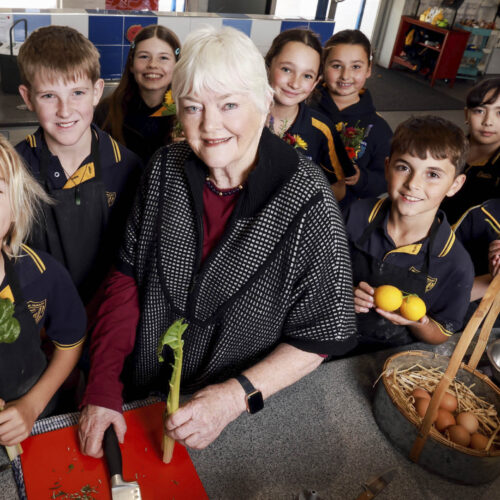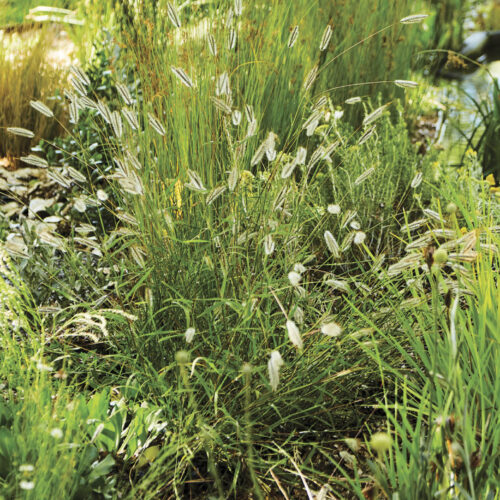Life according to Kevin McCloud
2020-02-05T01:52:51+11:00
Kylie McGregor talks with Kevin McCloud, environmentalist, writer and intriguing host of BAFTA award-winning Grand Designs, about community, buiilding homes and the future.
As host of the ABC series Grand Designs, Kevin McCloud is known for his gentle but pointed coaching of home builders through what is usually a troublesome experience, often admiring their gumption if not their budgeting skills. He’s also shared his own adventures, as he and his mates put together an eco-friendly shed using only recycled and found material in his show Man Made Home.
His architectural knowledge and enthusiasm know no bounds, nor does his determination to get us all thinking differently about the way we live.
Q: In Kevin McCloud’s 43 Principles of Home (published in 2010), number 43 is: ‘Sharing is a fundamentally civilised form of behaviour that is at the root of sustainable living.’ Can you explain how that works?
A: There are currently 7.5 billion of us on the planet and by 2050 there may be 10 billion, or a great deal more, and the problem is we have a finite amount of resources. So the only way we are going to make it work is if we start thinking about ways in which we can share resources so we can benefit and still have enough left over for our children and the generations beyond. By getting people to share everyday resources in their communities (be it car pooling, community food gardens, shared water resources) it delivers not only sustainable objectives but also other benefits, including the psychological, social and physical wellbeing of those communities. By sharing resources we are reducing our environmental load and building a resilient community. That principle of sharing is like a secret weapon.
Q: You also talk about the overuse of the term ‘sustainable’, aiming for ‘slow living’ instead. What are the fundamentals of that as opposed to ‘fast’ living?
A: I’m a big advocate of making and doing – whether that’s repairing a chair, or cooking, or knitting a cushion cover, anything that doesn’t involve looking at a screen. These things put us in touch with a quarter of a million years of evolution. Physiologically we are not designed to sit and look at screens. We are designed to amble and walk, to collect berries, to weave clothes and make furniture, to talk and socialise, to be part of a community. When we do these things, they are incredibly satisfying and are great stress relievers. We produce a lot of serotonin when we do these things as opposed to dopamine, which is what you produce when you go shopping.
Q: You also encourage repurposing and upcycling and do a lot of that yourself, especially in the transportable shed you made in the series Man Made Home. how important do you see these two practices?
A: I met a man recently who is the head of one of the biggest recycling companies in the UK. He is basically responsible for all the waste in London and is very passionate about upcycling and recycling. He showed me plastics that had been made from oil grown on algae on human sewerage from a sewerage farm. His view was very simple: in the UK – and Australia – we already have enough of everything to continue in a closed loop cycle. We can make everything we need for the future out of our own rubbish by recycling and upcycling. We produce a vast quantity of rubbish every year and it is all, mostly, reusable. I think, and hope, we are on the verge of a recycling and upcycling revolution because the technology is already there that allows us to recycle and upcycle almost anything.
Q: You have studied architecture throughout history and seen a wide range of building designs in the 20 years you have hosted Grand Designs, so what would you describe as good building design?
A: Every architect, not just me, will point you towards a man called Vitruvius, a Roman architect in the first century BC who said that all good buildings ought to deliver three objectives: they should be firm and sound and well built; they should also be comfortable and ergonomic to use; and they should be delightful and pleasurable. Those terms have stuck. I think in this age it’s really important that we generate buildings that are really well built, comfortable and delightful, but they also have to be sustainable.
Q: Are there innovative eco-building materials you have seen that are making a difference?
A: In the UK we are seeing all kinds of heating and ventilation equipment and technologies emerging. There are new techniques and developments in insulation, concretes and low-carbon materials. But there’s a word of warning here: in the UK and Australia, the government targets for environmental performance in materials and buildings have shifted away from the focus of politicians. And I mention politicians for one very important reason: if you do not have strong government policies and legislation in place that sets targets for [environmental] performance levels, then industry won’t respond or deliver.
Q: Overseeing the many projects on Grand Designs, where houses can be quite immense using resources on a large scale, do you see environmental concerns playing a greater role?
A: First of all, building is a slow process [laughs]. The very act of commissioning [a build] puts people in touch with their local economy, the tangibility of resources, and many people are really shocked because they’ve never had that intimacy with the building process and material. There is, of course, that tremendous paradox: you use large quantities of materials. Some end up being quite upset at having not realised the total impact. They become, perhaps, a little sobered by the experience. How do I reconcile it? I ensure we try and film as many sound projects that are well thought through. Generally speaking, I really like the two- and three-bedroom houses that are pretty modest, where architects have to work really hard to design something that is functional on a budget.






